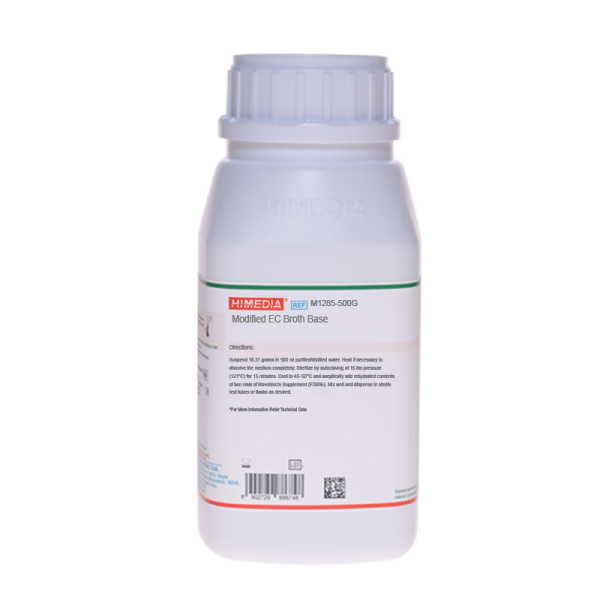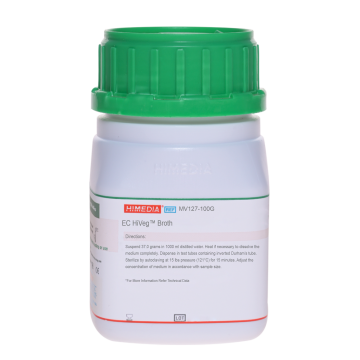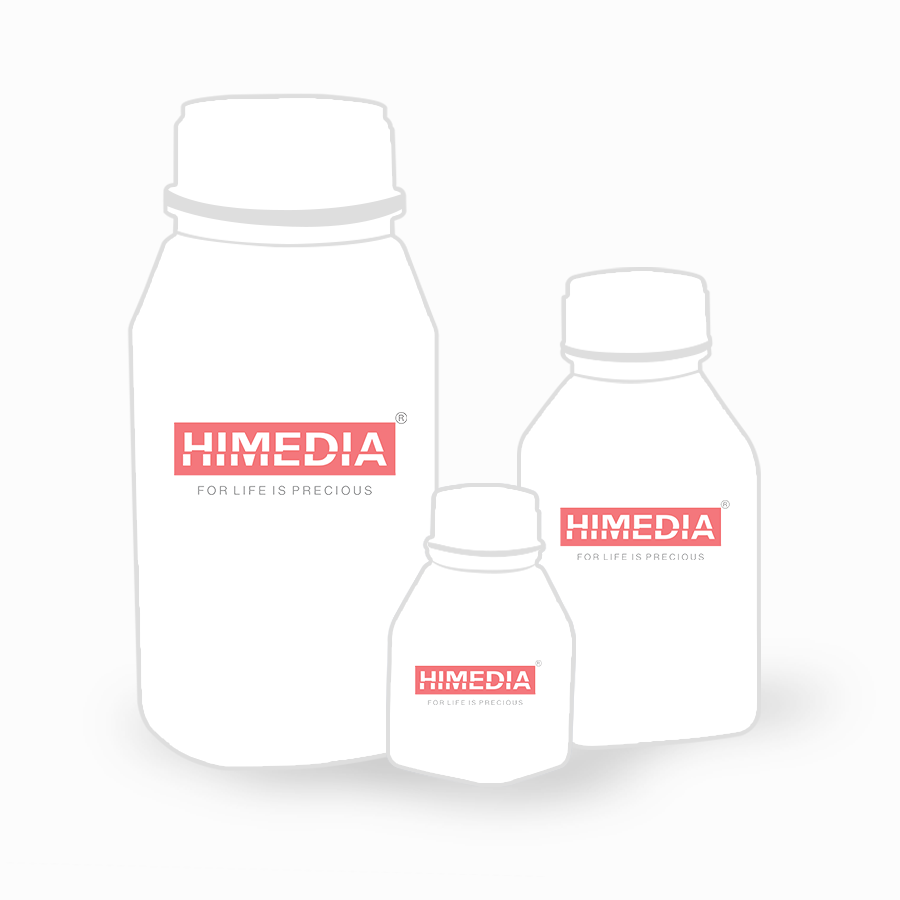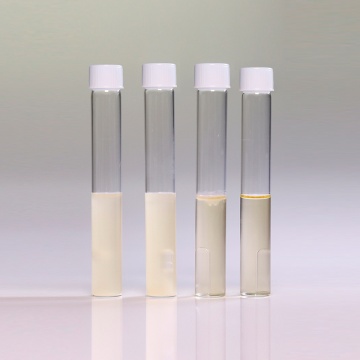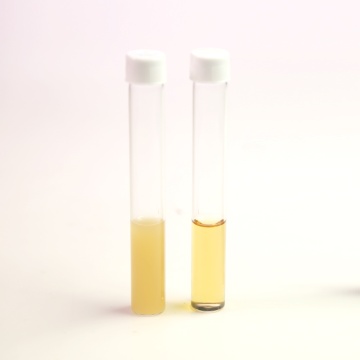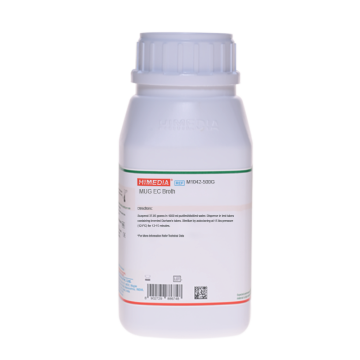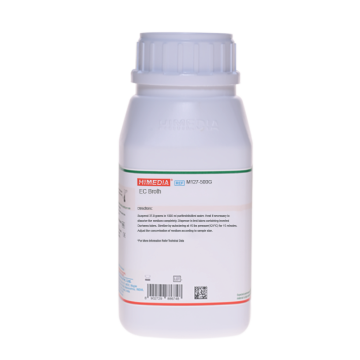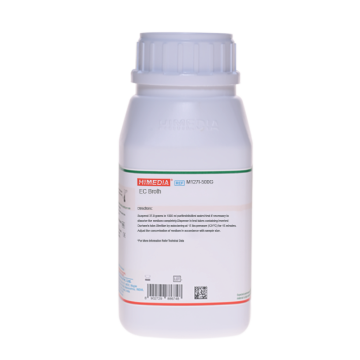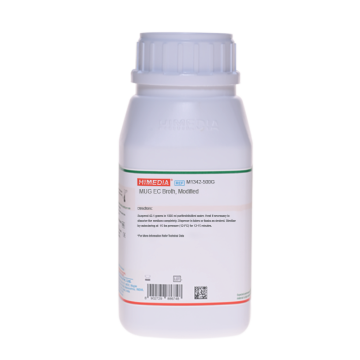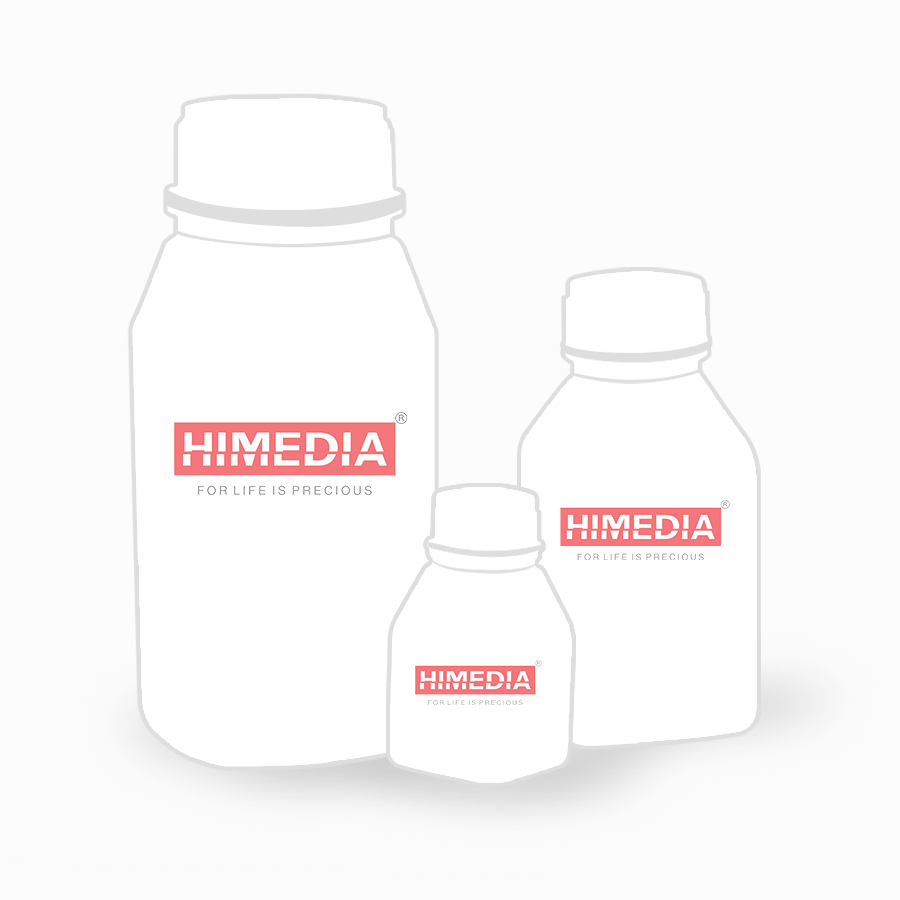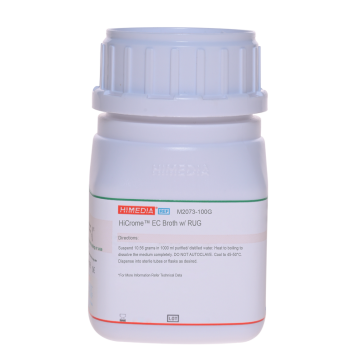 Your enquiry has been submitted
Your enquiry has been submitted
Modified EC Broth Base
Intended Use
Recommended for enrichment of Escherichia coli O157:H7 from food and other samples.
Composition
| Ingredients | g/L |
|---|---|
| Peptone | 20.000 |
| Sodium chloride | 5.000 |
| Lactose | 5.000 |
| Bile salts mixture | 1.120 |
| Dipotassium hydrogen phosphate | 4.000 |
| Potassium dihydrogen phosphate | 1.500 |
Final pH (at 25°C): 6.9±0.2
Formula adjusted, standardized to suit performance parameters
Directions
Suspend 18.31 grams in 500 ml purified/distilled water. Heat if necessary to dissolve the medium completely. Sterilize by autoclaving at 15 lbs pressure (121°C) for 15 minutes. Cool to 45-50°C and aseptically add rehydrated contents of two vials of NO 5 Selective Supplement (FD096). Mix well and dispense in sterile test tubes or flasks as desired.
Principle And Interpretation
EC Medium was originally developed by Hajna and Perry (1) for improved detection of coliforms. The current formulation is a combination of lactose broth, bile salts mixture and buffering agents. Peptone serves as a rich source of nitrogen, vitamins and amino acids. Lactose provides the carbon source for lactose fermenting microorganisms. The addition of bile salts mixture inhibits the growth of gram positive bacteria particularly bacilli and faecal streptococci. Sodium chloride maintains the osmotic balance of the medium. Potassium salts buffers the medium. The addition of novobiocin inhibits gram positive bacteria.
Type of specimen
Food samples
Specimen Collection and Handling
For food samples, follow appropriate techniques for sample collection and processing as per guidelines (2). After use, contaminated materials must be sterilized by autoclaving before discarding.
Warning and Precautions
Read the label before opening the container. Wear protective gloves/protective clothing/eye protection/face protection. Follow good microbiological lab practices while handling specimens and culture. Standard precautions as per established guidelines should be followed while handling specimens. Safety guidelines may be referred in individual safety data sheets.
Limitations
- Individual organisms differ in their growth requirement and may show variable growth patterns on the medium.
- Further biochemical and serological tests must be carried out for further identification.
- Each lot of the medium has been tested for the organisms specified on the COA. It is recommended to users to validate the medium for any specific microorganism other than mentioned in the COA based on the user's unique requirement.
Performance and Evaluation
Performance of the medium is expected when used as per the direction on the label within the expiry period when stored at recommended temperature.
Quality Control
Appearance: Cream to yellow homogeneous free flowing powder
Colour and Clarity of Prepared Medium
Light amber clear solution without any precipitate
Reaction
Reaction of 3.66% w/v aqueous solution at 25°C. pH: 6.9±0.2
pH
6.70-7.10
Cultural Response
Cultural characteristics observed with added NO 5 Selective Supplement (FD096) after an incubation at 35-37°C for 18-24 hours.
| Organism | Inoculum(CFU) | Growth |
|---|---|---|
| Escherichia coli O157:H7 | 50-100 | luxuriant |
| Escherichia coli ATCC 25922 (00013*) | 50-100 | luxuriant |
| Enterococcus faecalis ATCC 29212 (00087*) | >=104 | inhibited |
| Staphylococcus aureus subsp. aureus ATCC 25923 (00034*) | >=104 | inhibited |
| Bacillus spizizenii ATCC 6633 (00003*) | >=104 | inhibited |
Key: *- Corresponding WDCM Numbers **Formerly known as Bacillus subtilis subsp. spizizenii
Storage and Shelf Life
Store between 10-30°C in a tightly closed container and the prepared medium at 2-8°C. Use before expiry date on the label. On opening, product should be properly stored dry, after tightly capping the bottle inorder to prevent lump formation due to the hygroscopic nature of the product. Improper storage of the product may lead to lump formation. Store in dry ventilated area protected from extremes of temperature and sources of ignition. Seal the container tightly after use. Product performance is best if used within stated expiry period.
Disposal
User must ensure safe disposal by autoclaving and/or incineration of used or unusable preparations of this product. Follow established laboratory procedures in disposing of infectious materials and material that comes into contact with sample must be decontaminated and disposed of in accordance with current laboratory techniques (3,4).
References
- Hajna A.A., a. Perry C.A., 1943, Am. J. Pbl. Hlth. 33:550-556.
- Salfinger Y., and Tortorello M.L., 2015, Compendium of Methods for the Microbiological Examination of Foods, 5th Ed., American Public Health Association, Washington, D.C.
- Isenberg, H.D. Clinical Microbiology Procedures Handbook 2nd Edition.
- Jorgensen, J.H., Pfaller, M.A., Carroll, K.C., Funke, G., Landry, M.L., Richter, S.S and Warnock., D.W. (2015) Manual of Clinical Microbiology, 11th Edition. Vol. 1.
| Product Name | Modified EC Broth Base |
|---|---|
| SKU | M1285 |
| Product Type | Regular |
| Physical Form | Powder |
| Origin | Animal |
| Packaging type | HDPE |
| References | 1.Hajna A.A., a. Perry C.A., 1943, Am. J. Pbl. Hlth. 33:550-556. |
| Customized Product Available | No |



